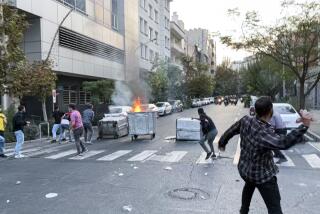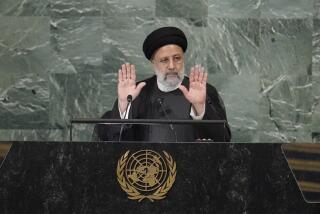Iran nuclear deal close, but important issues remain, Kerry says
WASHINGTON -- Secretary of State John F. Kerry joined closed-door talks in Geneva on Friday amid indications that Iran and six world powers might be on the verge of a breakthrough in curbing the Islamic Republic’s nuclear ambitions.
But Kerry cautioned that the two sides remain divided on some key issues before they can sign a deal that will begin putting limits on Iran’s disputed nuclear program.
With expectations soaring that a decade of thus-far fruitless negotiations might finally be closing in on a preliminary agreement, Kerry told reporters at the Intercontinental Hotel in Geneva that there is “not an agreement at this time.”
“Some very important issues on the table are unresolved,” Kerry said, adding that it is important that they be “properly, thoroughly addressed.”
Kerry’s comments suggested that there may be, at the very least, some delay in reaching an accord, which Iranian officials have said could be completed before the end of the day. If final sticking points remain, officials have said it is possible the delegations might stay in Geneva to finish the work on Saturday.
The deal, which would be the first substantial agreement on the nuclear program after years of diplomatic wrangling, promises to give Iran limited relief from Western economic sanctions in exchange for some curbs on the fast-advancing nuclear program.
Iran has long said its nuclear developments are exclusively aimed at civilian uses, such as power generation and medical research. The six powers, however, suspect that Tehran’s uranium enrichment activity is intended to create fuel for a nuclear bomb.
The extent of curbs on Iran’s enrichment -- a highly charged issue -- remains unclear. Iranian officials are declaring that they will halt some but not all enrichment activities, apparently reserving the right to refine fuel at lower levels.
But some U.S. allies, including Israel, are strongly opposed to allowing any enrichment, fearing that would open the door for Tehran to continue secretly moving toward a nuclear weapons capability.
The news Thursday that a deal was close caused excitement among supporters of a diplomatic solution but stirred anger and alarm among some Israeli officials and other hawks, who believe that Iran should be forced to give up its entire nuclear infrastructure.
Israeli Prime Minister Benjamin Netanyahu continued Friday to strongly criticize the reported deal and the Obama administration’s approach. Other U.S. allies worried by the prospect of an Iranian nuclear bomb, such as Saudi Arabia, are expected to also be unsettled by the reportedly nearing agreement.
American critics of an agreement with Iran say they believe that the agreement will not force Iran to halt work at its plutonium-based heavy water reactor at Arak, which they consider a special danger. U.S. officials have so far not detailed the terms of the deal.
Catherine Ashton, the European Union’s foreign policy chief, met Friday with the delegation from the six nations -- the United States, Russia, Britain, France, China and Germany -- and with Mohammad Javad Zarif, Iran’s foreign minister. French Foreign Minister Laurent Fabius was reportedly joining the Geneva discussions as well.
Israel’s displeasure with the deal shifts a spotlight to Congress and its divided views on how to resolve the standoff over Iran’s nuclear program. Lawmakers opposed to an accord could, in theory, try to sink the deal by piling on additional tough sanctions in an effort to drive Iran from the bargaining table.
But it may be difficult, analysts say, for lawmakers to be seen trying to torpedo an agreement and leaving a U.S. military attack as the only remaining way to halt Iran’s program.
Kerry had been on a trip to the Middle East when he detoured to Geneva to join other foreign ministers and senior diplomats from Iran and the six powers. Kerry’s suddenly revised itinerary fueled speculation that an agreement was imminent.
Iranian media described a mood of cautious optimism, even among hard-liners wary of nuclear compromise and any improvement in ties with the United States. Zarif told CNN that it he considered it possible to “reach an understanding for an agreement” during the current round of talks that were supposed to conclude Friday.
Iran’s new president, Hassan Rouhani, has made easing international sanctions that have crippled his nation’s economy a priority objective of his administration. Rouhani has made conciliatory gestures toward the West and spoke by telephone with Obama in September, the highest-level contact between the two nations since the 1979 Islamic Revolution and U.S. Embassy siege.
ALSO:
Palestinians blame Israel for Arafat’s poisoning
Toronto mayor says he was ‘extremely inebriated’ in video rant
Sochi Olympic torch: A diving, climbing, spacewalking competitor
Twitter: @richtpau
Times staff writer Patrick McDonnell in Beirut contributed to this report.
More to Read
Sign up for Essential California
The most important California stories and recommendations in your inbox every morning.
You may occasionally receive promotional content from the Los Angeles Times.










